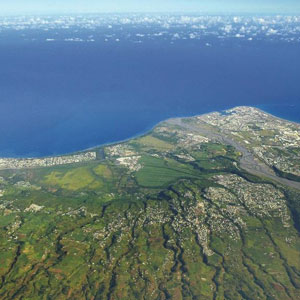Questions you may have about Reunion Island
 How do you get to Reunion Island?
How do you get to Reunion Island?
Reunion Island is about 11 hours' flight from mainland France. It is serviced by 6 airlines with over 40 flights per week to mainland France. Other direct flights connect to South Africa, Madagascar, India, Thailand, Mayotte, Mauritius, the Comoros and the Seychelles...
Reunion has two airports, one located near the main town of Saint-Denis, and the second at Saint-Pierre, in the South of the island.
The island is connected to the rest of the world by several trans-oceanic submarine cables propelling it into the age of ultra-high speed internet. 5 internet service providers and operators offer ADSL, fibre optic and 4G services comparable to those in mainland France.
According to a study carried out by Médiamétrie, more than 60% of the population of Reunion Island over the age of 13 is connected to the Internet at least once a month.
 Training and innovation
Training and innovation
Réunion is renowned for its high level of education in many disciplines.
In addition to 130 secondary schools, there is a European University represented by the two northern and southern branches of the University of Réunion, as well as numerous training establishments specialising in construction, sustainable development, engineering, commerce, the hotel industry, etc.
The island boasted more than 21,000 students for the 2017-2018 academic year.

A multi-ethnic cultural model
Ethnic diversity is a feature of Reunion Island. A crossroads of European, Malagasy, Indian, Asian and African cultures, this melting pot of an island is a perfect example of living together.
Today, it offers the mixed face of a multi-ethnic and multi-cultural society that lives together in harmony and serenity. Reunion Island is rich in a unique mix of cultures, found in religion, culture, cuisine, art and traditional music.
Maloya, the emblematic music and dance of Reunion Island, has also been listed as a UNESCO World Heritage Site.

What is the island’s economic situation?
A European territory in the heart of the Indian Ocean, Reunion Island offers opportunities for a secure investment environment and a dynamic working environment open to the world. The island is regulated under French law and belongs to the Eurozone.
The tertiary sector is the main driver of the economy with strong growth potential in the tourism, sustainable development and new technology domains.
The GDP growth is higher than the metropolitan average, 80% of which is generated by the tertiary sector and 95% by VSEs. A young, dynamic and well educated population as well as the dynamism of its economy, its appeal to tourists and its demographic growth are all incentives to pursue a real estate investment project.
 The infrastructure
The infrastructure
Modern and efficient, the island's infrastructure supports economic projects:
- A highly developed road network with 1,100 km of national roads, including 150 kms of dual carriageways.
- 2 international airports open to Europe, the Indian Ocean, Asia and Africa.
- The largest viaduct in France is currently under construction over the ocean.
- The Grand Port Maritime of Reunion, the island's economic pillar, is the only port in France to combine the five functions of a ferry terminal, commercial port, naval base, marina and fishing port.
- In the healthcare sector, Reunion has the best equipment of European standards with two centres awarded the CHU label (University Hospital Centre), which allows for all types of treatment to be carried out on site.
There is also a cyclotron, used for basic and applied research in human health, as well as many private and public health centres.
The major national retail chains and local public services are represented on the island.
 How often do cyclones occur in Réunion?
How often do cyclones occur in Réunion?
The year is divided into two seasons (cool and dry/hot and humid). The weather is generally ideal throughout the year, sometimes punctuated by the passage of tropical storms which can develop into tropical cyclones.
These bring strong winds but mostly beneficial rainfall. These phenomena are irregular and do not occur every year. In January 2018, storm Berguitta hit Reunion (mainly in the South) causing considerable material damage, particularly to roads.